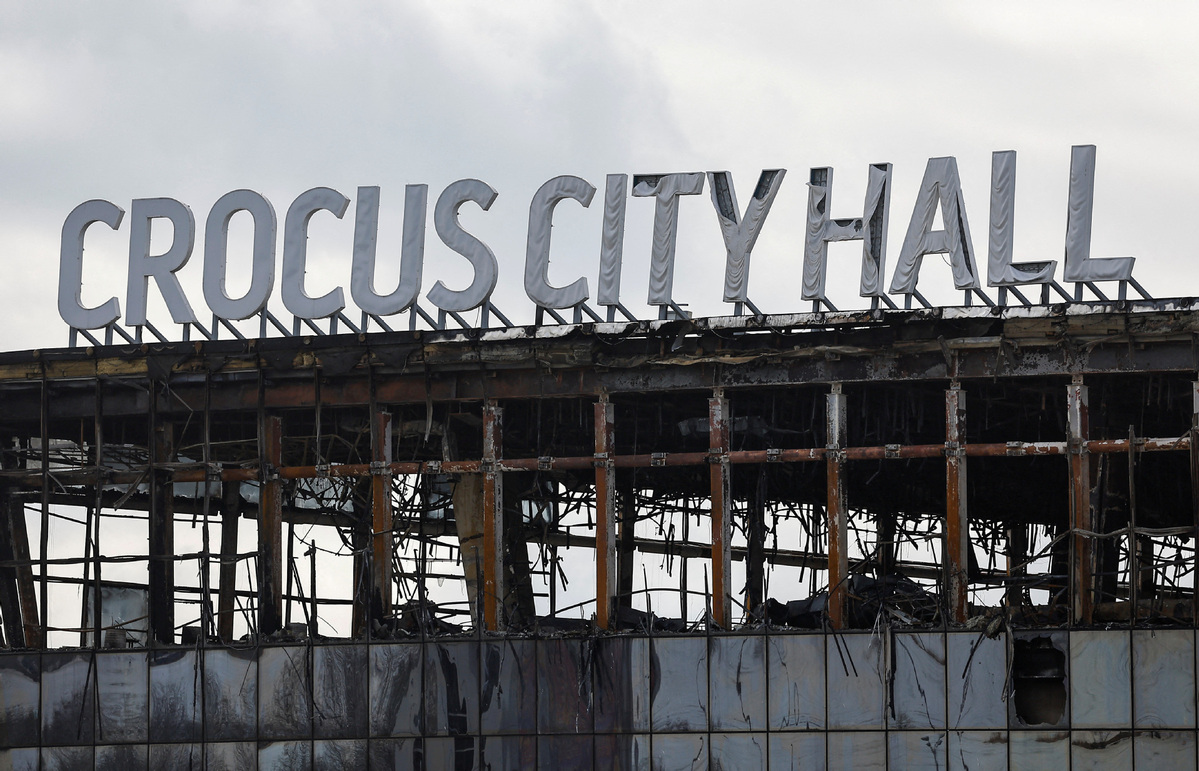
A view shows the burnt-out Crocus City Hall following a deadly attack on the concert venue outside Moscow, Russia, on March 26. [Photo/Agencies]
By Chen Siyang
It is no surprise that during the ongoing visit of the top Chinese leader to Europe, certain Western media outlets are playing up the Russia-Ukraine conflict in their effort to shift the blame for the Ukraine crisis onto China. The Russia-Ukraine conflict has indeed cast a shadow of war over Europe. Yet it is essential that Europe seeks peace from within, not from external sources. The European Union, in particular, should abandon its holier-than-thou attitude and veneer of infallibility, and instead indulge in some introspection to resolve the Ukraine crisis.
China has been engaged in mediating peace between Moscow and Kyiv, by urging them to return to the negotiation table. But one should remember that China is not a participant in the conflict nor did it trigger it.
Nazi Germany's unconditional surrender on May 8, 1945, brought to an end World War II in Europe. Since then May 8 has been celebrated as Victory in Europe Day by many European countries to express their love for peace. Russia celebrates VE Day on May 9, because by the time all combat in Europe ended, it was already May 9 in the Soviet Union.
Following five years of reflection and deliberations since the end of World War II, then French foreign minister Robert Schuman proposed the Schuman Declaration — creating a European Coal and Steel Community under the control of a common High Authority — on May 9, 1950, in the hope of ending the conflict between France and Germany and preventing another war in Europe. That formed the embryo of what we know as the European Union today — and since then, the day has been observed as Europe Day, to remind future generations to learn from history and cherish peace.
Now, 79 years later, Europe once again faces the specter of an armed conflict.
To maintain peace in Europe, the EU should distance itself from the US-led NATO's military maneuverings and instead work toward reconciliation with Russia. The root cause of the Ukraine crisis can be traced to NATO's incessant eastward expansion despite Russia's warning that, by doing so, NATO was threatening its national security.
China, too, has been a victim of NATO's military adventurism. In 1999, the United States-led NATO launched air strikes on a sovereign state, the Federal Republic of Yugoslavia, without the approval of the UN Security Council, and bombed the Chinese embassy in Belgrade, killing three Chinese journalists and injuring dozens of Chinese nationals.
The EU itself, should address the root cause of the Ukraine crisis and do more to end the Russia-Ukraine conflict. More than 30,000 people have been killed or wounded in the Ukraine conflict, and thousands of refugees have entered the EU via Poland and other Eastern European countries, causing one of the largest refugee waves in European history and plunging the EU into a humanitarian crisis that has become an immense burden on its social welfare system, and a risk to its social stability.
Additionally, the economic sanctions the EU has imposed on Russia have backfired — the EU registered a 0.4 percent GDP growth in 2023, with zero growth in the last quarter. Now that Russia and Ukraine, which used to be important energy and agricultural product suppliers for Europe, are unable to provide a stable supply of goods for the EU, the prices of many essentials have reached historic highs, aggravating inflation in Europe and dealing a serious blow to poor families.
The best way for EU to step out of the geopolitical vortex is to strengthen its own common security and collective defense, by adhering to a foreign policy free of US interference and influence. In March, the EU released its defense industrial strategy and industrial program, in a bid to better cope with geopolitical threats and reduce its dependency on the US for military equipment manufacturing.
Yet Europe is divided on having a collective defense and security policy. Since the start of the Russia-Ukraine conflict, French President Emmanuel Macron has been accusing German Chancellor Olaf Scholz of over-relying on the US and doing nothing to advance the EU's common security and defense policy. This shows intra-EU differences on security and defense are far from being resolved.
As such, the EU should first try to devise independent security and defense policy, rather than blame others for its woes, and look inward and correct its faults in order to maintain peace on the continent.
The author is a research fellow at the Institute of European Studies at the Chinese Academy of Social Sciences.













